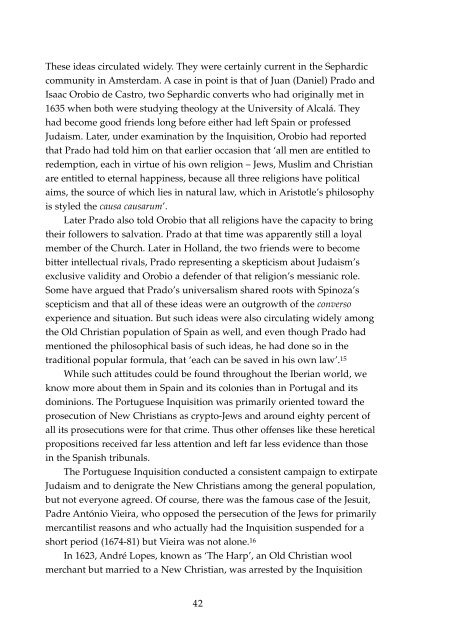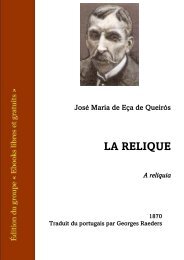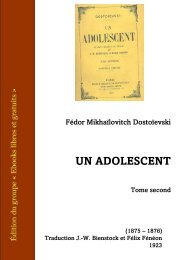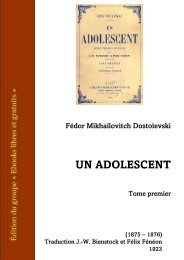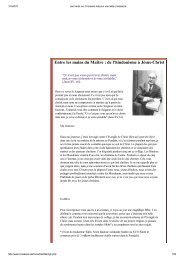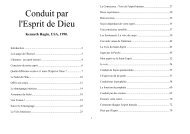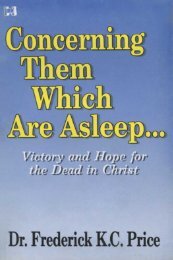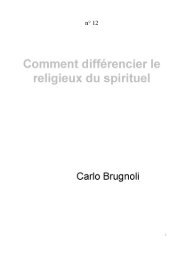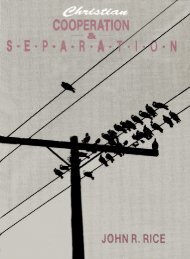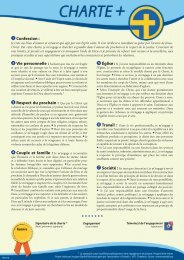The Expansion of tolerance
Create successful ePaper yourself
Turn your PDF publications into a flip-book with our unique Google optimized e-Paper software.
<strong>The</strong>se ideas circulated widely. <strong>The</strong>y were certainly current in the Sephardic<br />
community in Amsterdam. A case in point is that <strong>of</strong> Juan (Daniel) Prado and<br />
Isaac Orobio de Castro, two Sephardic converts who had originally met in<br />
1635 when both were studying theology at the University <strong>of</strong> Alcalá. <strong>The</strong>y<br />
had become good friends long before either had left Spain or pr<strong>of</strong>essed<br />
Judaism. Later, under examination by the Inquisition, Orobio had reported<br />
that Prado had told him on that earlier occasion that ‘all men are entitled to<br />
redemption, each in virtue <strong>of</strong> his own religion – Jews, Muslim and Christian<br />
are entitled to eternal happiness, because all three religions have political<br />
aims, the source <strong>of</strong> which lies in natural law, which in Aristotle’s philosophy<br />
is styled the causa causarum’.<br />
Later Prado also told Orobio that all religions have the capacity to bring<br />
their followers to salvation. Prado at that time was apparently still a loyal<br />
member <strong>of</strong> the Church. Later in Holland, the two friends were to become<br />
bitter intellectual rivals, Prado representing a skepticism about Judaism’s<br />
exclusive validity and Orobio a defender <strong>of</strong> that religion’s messianic role.<br />
Some have argued that Prado’s universalism shared roots with Spinoza’s<br />
scepticism and that all <strong>of</strong> these ideas were an outgrowth <strong>of</strong> the converso<br />
experience and situation. But such ideas were also circulating widely among<br />
the Old Christian population <strong>of</strong> Spain as well, and even though Prado had<br />
mentioned the philosophical basis <strong>of</strong> such ideas, he had done so in the<br />
traditional popular formula, that ‘each can be saved in his own law’. 15<br />
While such attitudes could be found throughout the Iberian world, we<br />
know more about them in Spain and its colonies than in Portugal and its<br />
dominions. <strong>The</strong> Portuguese Inquisition was primarily oriented toward the<br />
prosecution <strong>of</strong> New Christians as crypto-Jews and around eighty percent <strong>of</strong><br />
all its prosecutions were for that crime. Thus other <strong>of</strong>fenses like these heretical<br />
propositions received far less attention and left far less evidence than those<br />
in the Spanish tribunals.<br />
<strong>The</strong> Portuguese Inquisition conducted a consistent campaign to extirpate<br />
Judaism and to denigrate the New Christians among the general population,<br />
but not everyone agreed. Of course, there was the famous case <strong>of</strong> the Jesuit,<br />
Padre António Vieira, who opposed the persecution <strong>of</strong> the Jews for primarily<br />
mercantilist reasons and who actually had the Inquisition suspended for a<br />
short period (1674-81) but Vieira was not alone. 16<br />
In 1623, André Lopes, known as ‘<strong>The</strong> Harp’, an Old Christian wool<br />
merchant but married to a New Christian, was arrested by the Inquisition<br />
42


